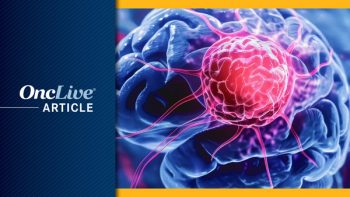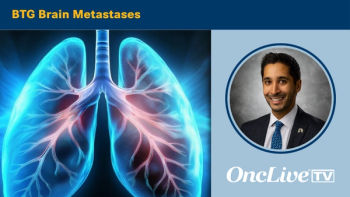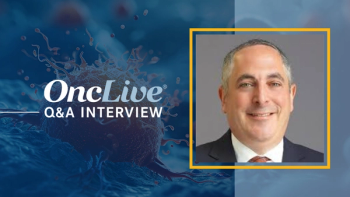
The Future of Glioblastoma
Transcript:Maciej Mrugala, MD, PhD, MPH: In terms of other therapies being investigated for glioblastoma, there are several what we call “small molecule inhibitors.” These are drugs that are targeting different kinases in the cancer cell. We know that multiple pathways are altered and abnormal in GBM. Frequently, concomitantly, we also understand now that blocking one pathway is typically not enough to arrest the cell in growth and division. Multiple approaches are currently being tested with agents that have the ability to block either one pathway at a time or multiple pathways at the same time. Also, combination therapies are being developed to use drugs that have different mechanisms of action to try to overcome the resistance of the glioblastoma cancer cell, and successfully trigger the apoptosis that would be a terminal event for the cancer cell and would hopefully halt the glioblastoma from growing.
We’re all trying to find a cure. I think at this stage, we’re probably not quite there yet. But, I think with recent developments with tumor treating fields, with new approaches with immunotherapy, we hopefully will be able to increase overall survival and hopefully convert glioblastoma into a more chronic, manageable condition that can be halted for months or for years, and would allow patients to continue living good quality of life. The ultimate goal, of course, is the cure, and I do hope that one day we’ll be able to find it.
Daniela Bota, MD: I think that there are a lot of unmet needs in glioblastoma. And the most important unmet need that we have is the next effective drug. We have to remember that we have, at this point, more or less 2 drugs and 1 device approved for glioblastoma. If you look to the treatments that are available for lung cancer and for melanoma, or for breast cancer, you’ll see that those diseases have 10, 15, or 20 treatments approved.
So, I think that our next stop is going to be to develop more effective drugs that cross the blood-brain barrier, that we’re going to find specific subgroups of patients—one drug is not going to be offered to all the patients. We will be defining who are the patients that are susceptible to different drugs based on different mutations going back to the idea of personalized medicine. I think that our immunotherapy will have to continue to be developed. We have promising studies, but we don’t have yet an FDA-approved treatment.
For me, as a researcher and a physician, the other unmet need is to make sure that the patients that survive and live for long periods of time, actually live with a great quality of life. So, every drug, every device, and every immunotherapy that we develop, we have to make 100% sure that it’s not destroying the normal brain. And if we do get problems with the normal brain due to the therapies that we have administered in the past, we have to work on creating neuro-restorative therapies that will allow the patients to recover their neurological function and their quality of life.
Suriya Jeyapalan, MD, MPH: One of the things I think we should think about with this device is, should we continue it past the 2 years? Is that something we should think about doing? That is what we have to think about as physicians when people ask us, “Do we need to stop using the device or not?” The second thing is this is not enough. When I was a fellow in 1999, survival at 2 years was probably under 5% for all-comers. Now this trial is showing that it’s at 43% in 2 years with the device. That’s huge! Think about it: in 15 years, we’re going from less than 5% to Temodar coming out about 25%, and with this trial, the 30% is now going up, with the addition of Optune to Temodar, to 43%. That’s a huge jump in survival. But, I want to get above 50%. The next 15 years of my career—because I’ll probably be retiring in about 15 years or so—is I’d like to see something else come on in. What do I think is out there? I think the vaccines are really interesting. I’m really hopeful that something will come out with these vaccines. I know people have been trying for decades. But, I think it’s going to be these alternative therapies for GBMs that are going to be useful. So, that’s what I’m really interested in. That’s what I tell people: “If you’re interested in participating in a clinical trial, think about going to a tertiary care center and participating. Sometimes you could do this in your community, as well, and the community oncologist could definitely run clinical trials.” So, what I would encourage community oncologists to do is open up clinical trials.
It’s tough. I have patients from Maine, Vermont, and New Hampshire. They all want to come down into Boston for their tertiary care, but at the end of the day, it’s hard. It’s hard to come and drive in here; maybe you’re not feeling well. I think if a lot of the local places maybe can help out in some ways, that would be great. So, that’s what I would say is probably the future.
I want to reiterate to all the medical oncologists out there, and I’ve been trying to do this in my own institution—and I had presented at Neurosciences Grand Rounds and Cancer Center Grand Rounds—the company is not resting on their laurels. This device is going to come out. They’ve already run successful phase II trials in pancreatic cancer and they’re starting the lung cancer trial. We’re going to do treatment to the brain metastases from lung cancer. You’re going to see this treatment modality is a totally novel treatment modality. I’m proud that it’s coming from the brain oncology folks. Usually, we steal from the body folks, but I’m proud that we’re the guys that are pushing this forward. And familiarize yourself with this. This is so easy to do. You can add any chemotherapy to it. It doesn’t cause any side effects, and it does improve survival. So, throwing down my gauntlet, my challenge to everybody in the audience is go out there, learn about it, use it on your patients, familiarize yourself with it, and be ready for the next wave in oncology. This is, I think, going to be the new modality that may help all of our patients.
Transcript Edited for Clarity




































